Date: 8/9th April 1945
Unit: No. 305 (P) Squadron.
Type: De Havilland Mosquito FB/VI
Serial/No. NT187
Coded: SM-V
Location: Near Olpe, in the Cologne 'pocket' area, Germany.
Pilot: F/Lt. Reginald Everson R.A.F. Baled out and captured.
Nav: Sgt. (Tony) R. A. W. Rudd R.A.F. Baled out and evaded capture.
REASON FOR LOSS: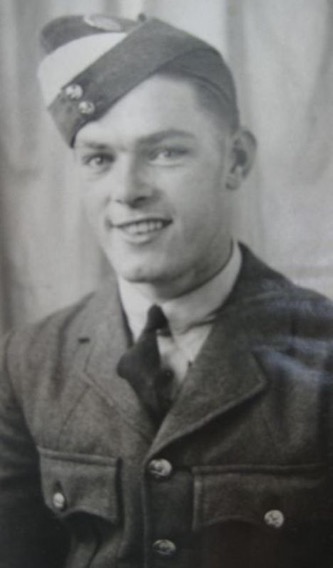 cc
cc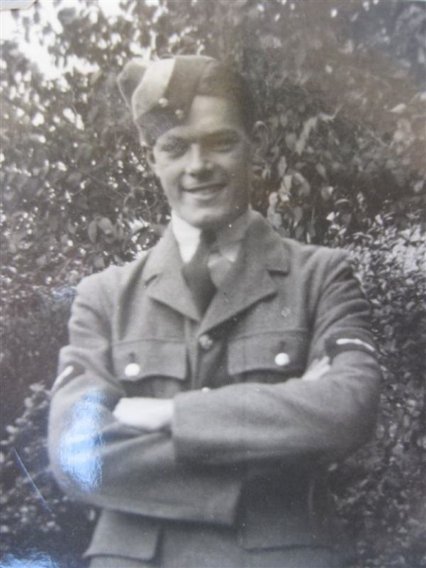
Two photos of Reg Everson during training before receiving his wings
Personal testimony of the pilot Reg Everson,
One particularly memorable operation took place on the 8th April 1945. My aircraft was unserviceable so I flew a Mosquito Letter V “borrowed” from Flight Sergeant Earle who was on leave (he never ceases to remind me that I lost his brand new aircraft).
After briefing we took off to patrol Leipzig, Berlin, Magdeburg, and the Braunsweig area. Due to the distance from base and the length of time for the flight we had to carry wing tanks with extra fuel. On patrolling the Berlin-Magdeburg road we saw some movement. We circled round and dropped flares on what was an enemy transport. We attacked them with machine gun and cannon fire. The transport stopped and appeared damaged, but the flares went out before we could assess the full extent of the damage. Returning at economical cruising to save fuel and flying at 4,000ft at about 2.00am, we were attacked by a night fighter. It fired a long burst of cannon fire and I immediately took violent evasion action, however the port engine caught fire.
Tony Rudd operated the fire extinguisher and I “feathered” the propeller. A further bust of gunfire and the starboard engine caught fire. I throttled back and operated the fire extinguisher but as the fire did not go out I ordered Tony to bale out. He clipped on his parachute, jettisoned the door and successfully abandoned the aircraft. During this manoeuvre the aircraft was losing height rapidly. I struggled out of my seat, having some trouble getting my left leg passed the control column and pulling the seat pack of my parachute clear of the bucket seat, at the same time trying to keep the aircraft on an even keel. With some difficulty I reached the doorway and dived through the opening. I pulled the ripcord as soon as I was clear of the aircraft, the parachute opened and I hit the ground almost simultaneously.
I landed at the bottom of a valley and saw my plane crash a short distance away. I was very close to a road and could hear vehicles moving along it. I kept low and attempted to crawl away but before I had moved more than a few feet I heard voices calling, "Commen Sie heir". I ignored this and continued to crawl away. With much shouting and shining of torches, six or seven German soldiers circled my position and started firing revolvers at me. Realising that I could not escape I stood up and raised my hands. I was searched and cigarettes, matches, penknife and comb were taken away from me. A German officer placed me under guard and we marched until daybreak. I was then put in a barn under armed guard. Later that morning a German Officer arrived on a motorbike and tried to question me. Finding me uncooperative he rode off. Later that afternoon one of the guards said, "Your comrade kaput." Suspecting this was a trick to get me to talk, I ignored this remark.
Prisoner of war;
At about 5.00 p.m I was taken to Gestapo Headquarters in Gummerbach where I was interrogated. Again the officer who spoke perfect English gave up and told me he had lived in Purley, England, and worked as an Insurance Agent. He chatted for a while, presumably hoping in vain for an unguarded comment from me. I was then taken to a Prisoner of War Camp, Stalag 6G, where they returned my comb- with escape compass in it! I was put in a wooden hut with a number of American airmen who had also been shot down.
After a few days we were roused one morning at 2.00am, given a mug of Ersatz coffee and marched away under armed guard.
During the day we were in column along roads when we attracted the attention of American Lightning fighters, which attacked us from time to time obviously thinking that we were German troops on the move. Each time we were strafed we took cover in ditches beside the road. After each attack the German guards tried to check that no prisoners were missing. A few did disappear into the woods on scavenging expeditions, rejoining us later to the confusion of the guards. Eventually they gave up trying to count us and we arrived at a P.O.W. camp near Enbach. Here chaos reigned. The guards were inefficient and we did not help as we moved about while they tried to take a roll call. Food at this time was: Breakfast- Ersatz coffee; lunch- soup (water that vegetables had been cooked in, but no vegetables); supper- black bread and “margarine.”
Liberation;
As it became increasingly clear that the advancing American troops were getting near the camp, administration of the camp was gradually taken over by the prisoners. By the time the 78th Division American Infantry arrived at 14.00 hours on the 12th April, the German guards had already handed over their rifles and revolvers and we were in complete control. Fresh food arrived shortly afterwards; fried chicken and real coffee were much appreciated.
The next few days were spent in Medical Checks, delousing, and checking identities. When this was completed we were taken to Giessen by truck and then to Paris by Dakota aircraft. In Paris we were looked after by the American authorities who supplied us with clean clothes, cigarettes and an advance of pay. We were allowed to roam free in Paris when we were not being interrogated and “processed.” For a few days I managed to get “lost” among the Americans until the R.A.F. discovered my presence and I had to report back to my unit at Epinoy.
Finding out who had actually shot us down;
When Tony arrived back he was able to provide some interesting details of our last flight. He was able to pinpoint the location and time of our being shot down. A US P-61 (Black Widow) night fighter put in a combat report claiming to have shot down a Ju 88 at precisely the position and time of the incident. British Intelligence proved that there were no enemy aircraft in the vicinity at that time. Air Vice Marshall Sir Basil Embry was not happy that one of his aircraft had been shot down by “friendly fire.”
Extracted from bbc.co.uk/ww2peopleswar
WW2 People's War is an online archive of wartime memories contributed by members of the public and gathered by the BBC. The archive can be found at the above excellent website.
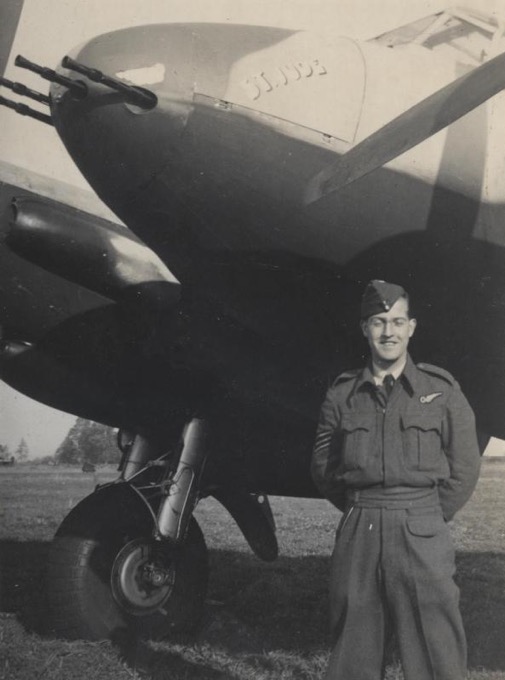
Tony Rudd with Mosquito named “St. Jude”
To Officer Commanding 138 Wing
R.A.F. B.L.A .
1805175 Sgt Rudd
305 Squadron
23rd April 1945
Subject - Incident occurring to A/c "V" number NT 187 on the night of 8/9 April at 02.15 hours
Sir,
I, 1805175, Sgt Rudd have the honour to report the details of the above incident. On the night of 8/9th April I was detailed as W/O Everson's navigator to fly on a railway patrol in an area extending from Brunswick to Berlin. The patrol having been completed, without damage of any kind to the aircraft, W/O Everson set course for base.
On the leg from Warburg to Cologne, approximately seven or eight minutes from the former, a short burst of gunfire was heard. No damage seemed to result. The origin of this gunfire was unknown, no enemy aircraft having been seen, and no flak observed. W/O Everson weaved on track to try to see something.
On the leg from Warburg to Cologne, approximately seven or eight minutes from the former, a short burst of gunfire was heard. No damage seemed to result. The origin of this gunfire was unknown, no enemy aircraft having been seen, and no flak observed. W/O Everson weaved on track to try to see something.
However, as I was checking our position, which showed the aircraft to be on track, I heard a definite burst of gunfire, fired in the air, most probably cannons. The starboard engine burst into flames, as did the starboard outer petrol tank: The heading of the aircraft was approximately 260 (T) height 2000ft above local ground level, 4,500ft indicated. Speed 240 indicated. At the time of the .attack we had been approximately ten minutes on track from Warburg. An aproximate position of the point of attack is 08 degrees N 07 degrees 50 E. The time was about 02.15 hours .
After the attack the starboard engine was feathered; and the automatic fire extinguisher was operated, entirely without effect. I did not observe what occurred to the port engine. The aircraft was obviously not maintaining height, and the starboard fire was completely out of control. W/O Everson ordered me to jettison the lower door and abandon the aircraft, this I did. As I went out I noticed the starboard wheel down, and enveloped in flames.
As soon as my parachute had opened, I watched for W/O Everson 's parachute opening. Failing to see it, I came to the conclusion that he had been unable to get out. The aircraft I saw crash and explode, about two or three miles further West.
Landing successfully I was captured by troops of the German Army, at 05.00 hours, as I was making south, at approximately one mile from the American Lines. The troops were composed of elderly infantrymen and young Luftwaffe aircrew . Treatment was reasonably considerate . Food and cigarettes were offered to me. I was not interrogated. My papers were demanded, and my identity card was scrutinized very carefully. I refused to answer their enquiries about the type of plane I was flying. This refusal was accepted without any trouble . I was then marched around, from one post to another, till at last I finished up in battalion headquarters . Here my number, rank and name was taken by a Lieutenant.
He spoke perfect English, having lived, as he said in Purley for fifteen years. The interview, in which he asked me the type of plane I flew, was one-sided and was over in a few minutes. Afterwards I was given quite a good and welcome meal, by the civilians in the house.
That evening I joined two American infantrymen captured in that sector, and we spent the night travelling slowly and painfully through enormous traffic jams of German equipment. The next day was similar. Food was equivalent to German army rations, treatment good. Finally the three of us arrived late at night at a town called Hainer where we joined forty more Americans, sleeping on straw in the school house.
Two days later the entire party was marched by night to Wermelskerchen, as the Allied advance.was within two miles of us. Outside Wermelkirchen we were billeted in a barn adjoining a farmhouse. The German guards here were at pains to show every consideration possible, to give away cigarettes and food. The Americans were advancing swiftly, and we were finally released on the 15th April. Throughout my capture, it seemed to me, the grave situation of the Germans dictated their practically fawning attitude. On the 15th April I was recaptured by American troops and handed over to S.H.A.E.F. authorities, rejoining my Squadron on the 22nd of April.
I have the honour to be, sir,
Your obedient servant,
R.A.W. Rudd Sgt.
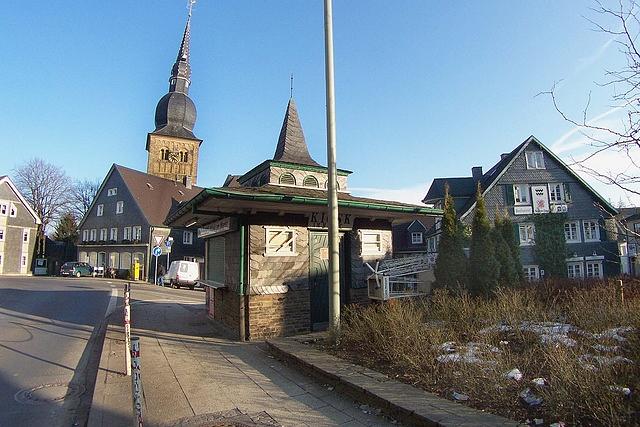
Wermelskirchen, the German town where Tony Rudd ended the war (net)
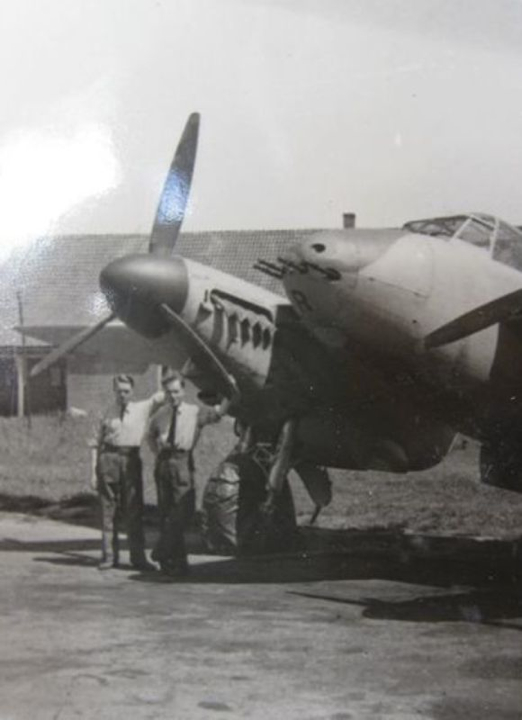
Reg, Tony & Mosquito (Saunders)
Post war research reveals the following;
In the night 8th/9th April 1945, USAAF's 414th NFS claims one Ju 188 in the area of F-7060, which is roughly in the area of Overath, East of Cologne, Germany.
Olynyk/Victory List No.5. pp.228, 403 & 595.
9 April 1945
414th NFS (ditto)
Northrop P-61
1/Lt (Pilot) Robert P Lutz
2/Lt (R/O) Wallace A Morrissette
Ju 188 - Location: F-7060
Researched and compiled by Melvin Brownless with special thanks to Adrian Saunders, David King, Col Bruggy and Horst Weber, not forgetting BBC Peoples War website for use of Reg’s personal account of the day. Updated July 2014.
